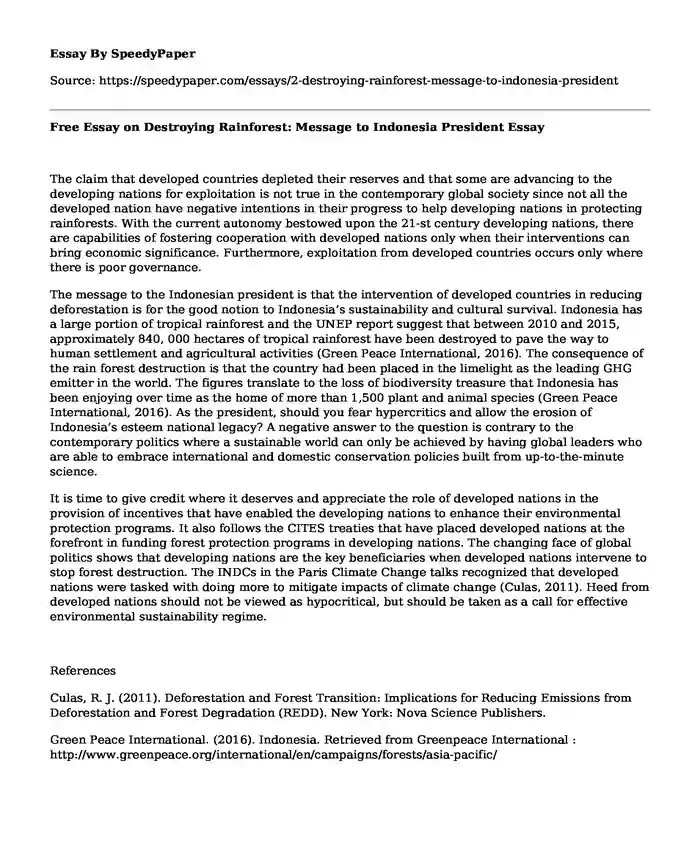
| Type of paper: | Essay |
| Categories: | Environment Ecology Forest |
| Pages: | 2 |
| Wordcount: | 426 words |
The claim that developed countries depleted their reserves and that some are advancing to the developing nations for exploitation is not true in the contemporary global society since not all the developed nation have negative intentions in their progress to help developing nations in protecting rainforests. With the current autonomy bestowed upon the 21-st century developing nations, there are capabilities of fostering cooperation with developed nations only when their interventions can bring economic significance. Furthermore, exploitation from developed countries occurs only where there is poor governance.
The message to the Indonesian president is that the intervention of developed countries in reducing deforestation is for the good notion to Indonesia’s sustainability and cultural survival. Indonesia has a large portion of tropical rainforest and the UNEP report suggest that between 2010 and 2015, approximately 840, 000 hectares of tropical rainforest have been destroyed to pave the way to human settlement and agricultural activities (Green Peace International, 2016). The consequence of the rain forest destruction is that the country had been placed in the limelight as the leading GHG emitter in the world. The figures translate to the loss of biodiversity treasure that Indonesia has been enjoying over time as the home of more than 1,500 plant and animal species (Green Peace International, 2016). As the president, should you fear hypercritics and allow the erosion of Indonesia’s esteem national legacy? A negative answer to the question is contrary to the contemporary politics where a sustainable world can only be achieved by having global leaders who are able to embrace international and domestic conservation policies built from up-to-the-minute science.
It is time to give credit where it deserves and appreciate the role of developed nations in the provision of incentives that have enabled the developing nations to enhance their environmental protection programs. It also follows the CITES treaties that have placed developed nations at the forefront in funding forest protection programs in developing nations. The changing face of global politics shows that developing nations are the key beneficiaries when developed nations intervene to stop forest destruction. The INDCs in the Paris Climate Change talks recognized that developed nations were tasked with doing more to mitigate impacts of climate change (Culas, 2011). Heed from developed nations should not be viewed as hypocritical, but should be taken as a call for effective environmental sustainability regime.
References
Culas, R. J. (2011). Deforestation and Forest Transition: Implications for Reducing Emissions from Deforestation and Forest Degradation (REDD). New York: Nova Science Publishers.
Green Peace International. (2016). Indonesia. Retrieved from Greenpeace International : http://www.greenpeace.org/international/en/campaigns/forests/asia-pacific/
Cite this page
Free Essay on Destroying Rainforest: Message to Indonesia President. (2017, Oct 26). Retrieved from https://speedypaper.com/essays/2-destroying-rainforest-message-to-indonesia-president
Request Removal
If you are the original author of this essay and no longer wish to have it published on the SpeedyPaper website, please click below to request its removal:
- Essay Example on TOR - The Dark Side of the Internet
- Free Essay Containing Urban Planning Thesis Topics
- Computer Science Project Proposal
- Need AACN Essentials essays? - Read an Essay Sample on AACN Essentials
- Free Essay in Criminal Justice - Racial Profiling
- The Socio-Cultural and Historical Contexts in Hermeneutical Practice, Free Essay
- Predicting Dependent Variables: Multiple Relapse Approach
Popular categories




